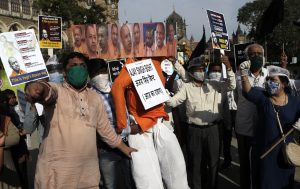A week before International Women’s Day, a court in the northern state of Uttar Pradesh, released three men accused of the brutal gang rape and murder of a 19-year-old Dalit girl in Hathras in September 2020. The court dismissed the rape and murder charges against the three despite the victim naming her assailants in her dying declaration. Significantly, the accused men are powerful upper caste ‘Thakurs’ while the victim belonged to the historically underprivileged Dalit community.
At the time of the incident, the Uttar Pradesh administration and police did everything to hush it up, even forcibly burning the victim’s body in the dead of night to remove any evidence.
Against this backdrop, the grandiose celebrations by the Bharatiya Janata Party (BJP) government to mark International Women’s Day today ring hollow. The verdict releasing the Hathras rapists is a stark reminder of what marginalized Dalit women face daily in India. As it is, women are discriminated against in India’s patriarchal society. The discrimination is further accentuated for lower caste Dalit women and those from minority communities.
Dalit women are considered “easy prey” by upper caste men, who harass them with impunity with no fear of reprisals. The law enforcement machinery, which is usually staffed by upper caste men, turns a blind eye to such atrocities committed against Dalit women.
The victim’s family, which lives under constant threat from the upper castes in their village Boolgarhi, lashed out against the judgment. Describing the verdict as “biased” the victim’s brother said that the family had “got the justice a Dalit deserves.”
“The verdict is according to our caste. Thakurs and Brahmins can do anything and they will still get away with it,” he pointed out. The family has vowed to continue to fight for justice and appeal in the High Court and even the Supreme Court if need be.
The case had put the BJP government in the state in the dock over its attempts to cover up the incident. The victim was raped savagely; her tongue was cut and her bones were broken. The Uttar Pradesh police went out of their way to weaken the case; they did not register gang rape charges initially and delayed the medical examination. The Director General of Police “with an obvious bias” pronounced that no rape had taken place.
To counter the negative publicity, the state government denied media entry into Hathras but alert television reporters caught the hurried cremation of the body by the police on camera. Only after widespread public outrage did the Allahabad High Court take suo motu cognizance of the case and came down heavily upon the authorities. An incensed Yogi Adityanath government even prevented opposition leaders, including the Congress’ Rahul Gandhi and Priyanka Gandhi from visiting the victim’s family by detaining them.
The case was then transferred to the central investigative agencies.
The blatant backing of the establishment for the upper caste accused at the time of the incident prompted a public debate on “why caste matters when a Dalit is raped.” The hashtag #DalitLivesMatter trended on social media.
The Special Judge Trilok Pal Singh hearing the Hathras case, let off three of the accused and convicted only one, who was sentenced to life imprisonment for offenses under the Scheduled Caste Scheduled Tribes (Prevention of Atrocities) Act and for homicide not amounting to murder i.e. Section 304 of the Indian Penal Code.
Highlighting the travesty of justice, the All India Democratic Women’s Association (AIDWA) pointed out that the judgment “reeks of patriarchal and casteist bias.” AIDWA questioned the “botched up investigation” and the dropping of the rape charge against the accused when the victim’s dying declaration is sufficient for conviction.
India’s otherwise vocal Minister for Women and Child Development Smriti Irani has been conspicuous by her silence on the court verdict. A loyal BJP parliamentarian, who toes the BJP line, Irani has never raised her voice against sexual violence against women in BJP-ruled states. Indeed, she did not condemn, the Gujarat government’s decision to release on grounds of “good behavior,” the 11 rapists of Bilkis Bano, a Muslim who was gang raped during the 2002 Gujarat riots. To attract Dalit votes, the Hindu nationalist BJP talks much about Dalit inclusion but practices Brahmin and upper caste hegemony, while keeping Dalits subordinated.
According to a recent report titled “Justice Denied,” on caste-based sexual violence against Dalit women, “Violence, including rape and gang rape, have been systematically utilized as weapons by dominant castes to oppress Dalit women and girls and reinforce structural gender and caste hierarchies.” The study by the Swabhiman Society and Equality Now, which examined the barriers to accessing justice for Dalit women and girls in another northern state Haryana, found that survivors of rape, especially Dalit women are silenced through threats and fear of repression by dominant (upper) castes with even the police refusing to register complaints. This results in a “culture of violence, silence, and impunity,” it said.
While the Hathras victim’s family continues to live in fear of reprisals, the Thakurs are jubilant. Welcoming the release of their three men, they maintain that all four were innocent, terming the case “a conspiracy.”
In such an oppressive casteist social order with little scope for justice, the majority of cases of sexual violence against Dalit women go unreported. Nonetheless, National Crime Records Bureau data reveals an alarming figure – almost ten Dalit women and girls are raped every day in India.
Bear in mind that this data is likely an underestimation.

































